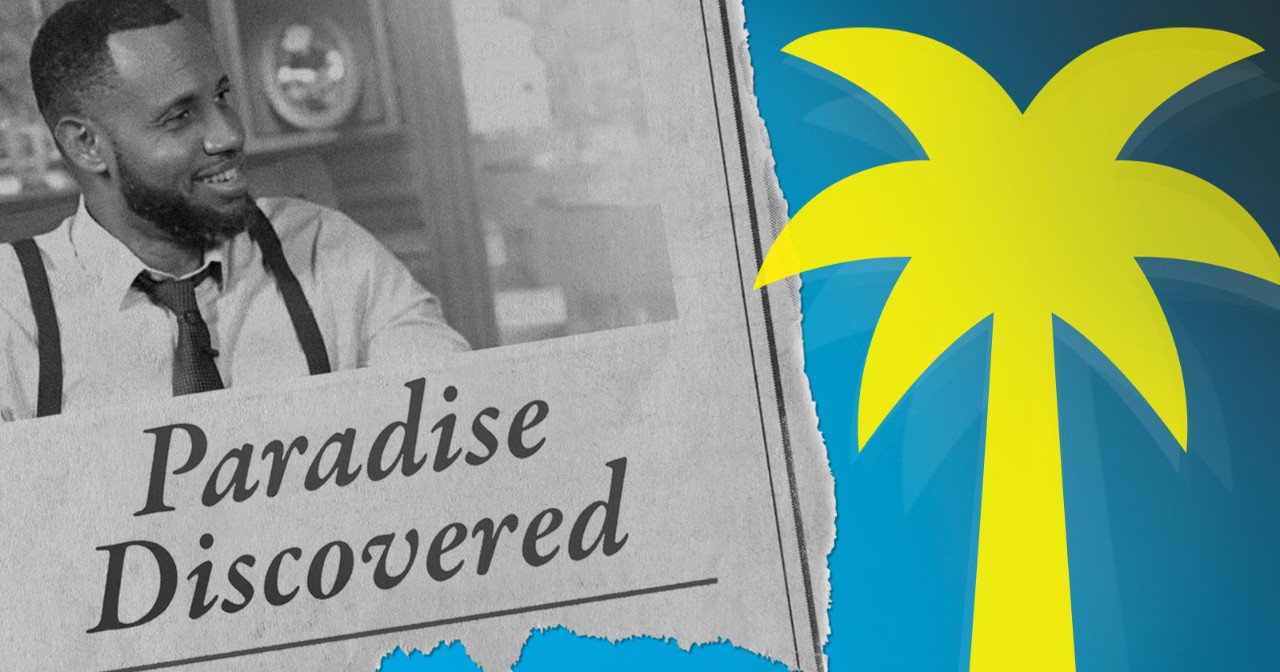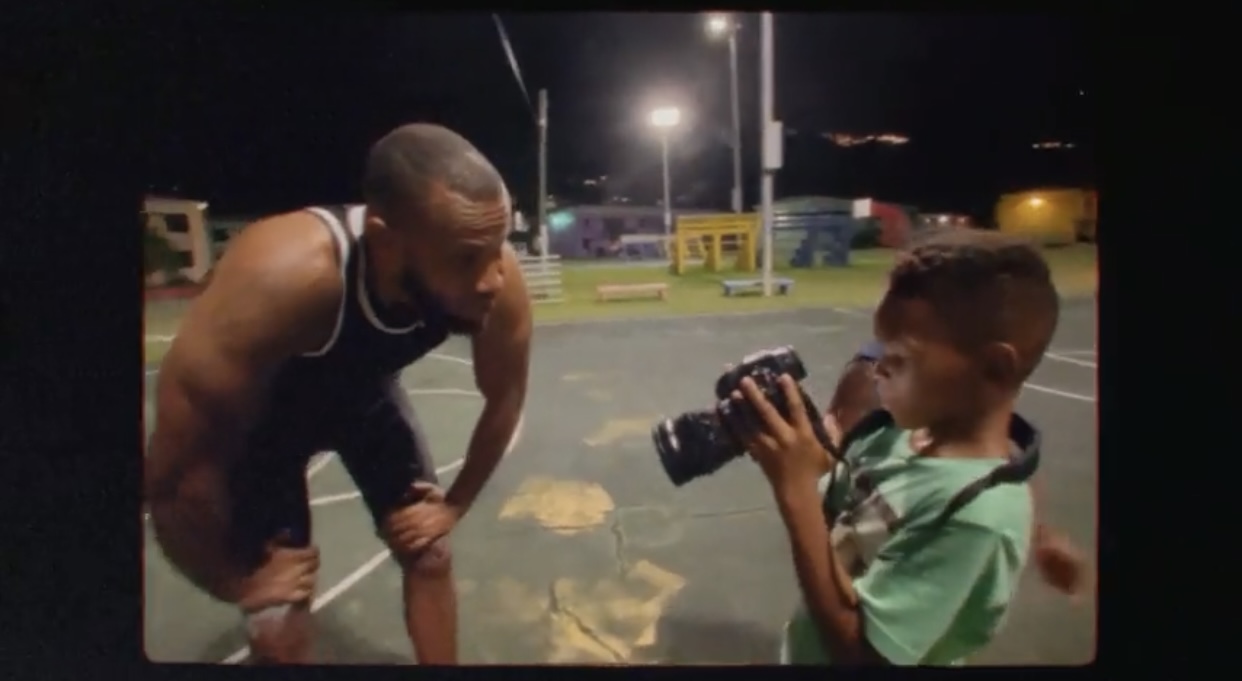


Owning Your Story
Images courtesy of Peter Bailey October 15, 2025
Blue Hen journalist captures the spirit and resilience of the Virgin Islands
Ask average Americans what they picture when they conjure the U.S. Virgin Islands, and they’ll likely mention cocktails and picture-perfect scenery. Peter Bailey, Class of 2002, understands. As someone whose childhood pastimes included hunting for whelk snails on the verdant cliffs of St. Thomas, he’s intimately familiar with the beauty of his Caribbean home. But he also knows it’s a place rooted in revolution. An international port where global influence meets local soul. A real-life Wakanda.
In other words, St. Thomas is a place with a story — many stories — to tell. And yet, “growing up there, I felt invisible—like I was buried underground with all these people in the dark,” Bailey said. “There was no internet, no social media, and CNN wouldn’t cover us. My mission is to shed some light.”
Today, Bailey and his business partner, fellow alumnus Jed JohnHope, Class of 2003, operate Yellow Cedar Media, an independent, digital news service focused on the culture, concerns and policies of the U.S. and British Virgin Islands. The Blue Hen also creates documentary films that capture the identity and resilience of his Caribbean home. The goal: providing multifaceted, authentic, community-driven journalism worthy of a multifaceted, authentic, community-driven place.

“This is about unearthing stories not just for the general public, but for our kids and future generations — so they know who we are,” Bailey said. “If you don’t own your own stories, someone else will tell them. That’s how you lose your power.”
It’s a lesson Bailey learned as an undergraduate at UD. Coming from a majority-Black St. Thomas where “all the images of power looked like me,” he experienced a paradigm shift on the U.S. mainland that instilled greater empathy for people on the margins: “Suddenly, I was existing in a place where I was not the star of the narrative.” And although that presented many challenges, it also served as a learning opportunity. “If you want to learn about this experiment we call America, how to fix it, advance it, be a part of it,” Bailey said, “Delaware is a great place to do it.”
If you don’t own your own stories, someone else will tell them. That’s how you lose your power."
During his time on campus, the Blue Hen connected with life-altering mentors, including the late Dennis Jackson, affectionately known as “Dr J.” One night after dinner at the professor’s house, Dr. J shared with Bailey that, as a young white boy growing up in Mississippi, he’d often snuck down a hill near his home to listen, rapt, to the beautiful singing of a choir inside a nearby Black church — until the day his family, members of the KKK, burned that church to the ground. It’s the reason the professor cut ties, eventually becoming a journalist who gave voice to the voiceless and advocated for diversity and inclusion in his field.

“He was a father figure to me,” said Bailey, whose own dad had been diagnosed with early-onset Alzheimer’s years before. “I think he recognized a like spirit—we were both rogues. He gave me the oomph I needed to pursue this storytelling path.”
As a student, Bailey lied about having access to adequate housing in order to secure a fellowship with The Village Voice. (What he actually had access to was a friend’s basement in an under-resourced project in Rockaway, N.Y.)
“My first day on the job, the boss tells me: ‘Get in the car you [expletive] bum; we’re going to city hall to get this crook, [then mayor] Rudy Giuliani’,” Bailey said. “I remember having to dress up as a construction worker to get inside spaces where I could access some of Giuliani’s papers. That was my introduction to mainstream journalism.”
The job led to stints at Newsweek and Newsday, followed by Time magazine. But it wasn’t until Bailey secured a job at the Miami Herald that he came into his own as a reporter.
“At the time, I don’t think a major American newspaper was covering the poor, and I wanted to know why,” he said. “I was told: ‘They don’t advertise, so they aren’t deemed necessary, but go ahead and try it — no one is going to read that crap’.”
For an “On the Margins” series, Bailey wrote stories about the recovering drug addict whose only affordable housing options were located near crack houses. And he covered the handicapped kids from an inner-city school who launched their own bakery in a section of Miami widely considered “the hood.”
That’s what journalists are supposed to do: offer clarity. It’s not that humans all hate each other; it’s that we don’t know each other."
“That’s my journalism style—getting you to look at people in a very human way,” Bailey said. “I take the person readers perceive as the villain and, by the time I’m done, they may not like the villain, but they’re understanding them a little more. That’s what journalists are supposed to do: offer clarity. It’s not that humans all hate each other; it’s that we don’t know each other.”
The work gained a fanatical following, from prison inmates to affluent South Beach socialites. A woman from the latter set invited Bailey to one of her frequent galas, a who’s-who of Miami. While at the dinner, the reporter connected with representatives of the rapper Trick Daddy, a pioneering hip-hop artist and cultural influencer. One thing led to another, and Bailey was soon commissioned to co-author the rapper’s biography. The 2010 Simon & Schuster book, Magic City: Trials of a Native Son, chronicles a struggle with poverty, violence and growing up in a marginalized community.

The experience launched Bailey into the entertainment sector, and he founded NiteCap, a Miami-based multimedia company known for producing a critically acclaimed conversation series. The NiteCap show, which aired on the web as well as Miami news platforms, facilitated positive, soulful discourse with high-profile entertainers, from 50 Cent to Fantasia, as well as civic leaders. (Most recently, Bailey sat down for a conversation with his old pal, Rudy Giuliani.) Topics have ranged from mental health to racial identity to the role of hip-hop in shaping political consciousness.
“It was hell,” Bailey said about the workload during those early days as an entrepreneur, adding that he wouldn’t take sponsorship deals from corporations who wanted influence over content. Instead, he sold ads — musical spots — to companies throwing their money behind up-and-coming artists. But that side of the hip-hop world can be dangerous. “I’d be in places trying to get my company off the ground, and they’d get shot up.”
The work paid off. The show resonated with audiences and major municipalities began approaching Bailey for help telling their stories. But amidst the success, disaster struck. In 2017, the U.S. Virgin Islands experienced back-to-back hurricanes, Irma and Maria. Bailey watched the chaos unfurl from inside his family’s home in St. Thomas.
It’s all about community here—I can’t go out to a bar or grocery store without running into someone I love deeply."
-Jed JohnHope
“It was the apocalypse,” he said. “I thought I was going to die. When you looked outside, you saw cows swirling in the wind, cars and boats swirling in the wind.”
During the months-long blackout that followed, Bailey once again felt the sting of invisibility. He didn’t see mainstream media covering the plight of his U.S. territory in a meaningful, resonant way. So, in the only place he could access internet, the parking lot of a nearby hospital, he penned a deeply personal op-ed published in The New York Times. The piece, Has America Forgotten the Virgin Islands?, helped shift a national conversation about the islands — from tourist destinations to homes in need of policy, infrastructure and care. It also became the catalyst for a new project: Bailey threw himself into the world of filmmaking, launching the Paradise Discovered documentary series, which chronicles the rebuilding process while exploring broader themes of climate change and cultural preservation. The series has earned global recognition at film festivals in Toronto and Grenada.

The work caught the attention of Jed JohnHope, a St. Croix native who first met Bailey as a fellow UD undergraduate. (He still remembers how impressed he felt when Bill Clinton came to campus and Bailey somehow managed to score an interview: “I thought to myself: Who is this guy?”) The friends initially connected over a shared passion for their Caribbean home, and they started a conversation about supporting the Virgin Islands that’s lasted 25 years.
“It’s all about community here — I can’t go out to a bar or grocery store without running into someone I love deeply,’” said JohnHope, a tech engineer, on the site. “We need to give back.”
Earlier this year, the Blue Hens partnered on the launch of Yellow Cedar Media, a bipartisan news service named for a resilient state flower. The platform centers local voices, producing stories crafted by and for Virgin Islanders.
Rather than chasing sensational headlines, Yellow Cedar dives deeper — offering thoughtful reporting, cultural storytelling, and conversations with community leaders. The organization seeks to spark dialogue, strengthen identity, and reflect the full complexity of island life — not just hardship or despair, currency of a 24/7 news cycle, but humanity and joy.
“If my media keeps showing me pain and suffering and war and death, I become that,” Bailey said. “We’ve got to find the light. We’ve got to get people hooked on beauty again.”
Contact Us
Have a UDaily story idea?
Contact us at ocm@udel.edu
Members of the press
Contact us at mediarelations@udel.edu or visit the Media Relations website

